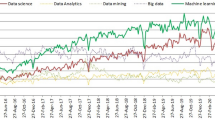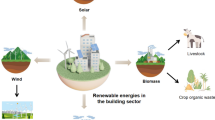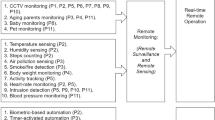Abstract
European and national policies are aimed at reducing greenhouse gases and increasing energy efficiency—also in the household sector. For this purpose, new solutions for private homes based on information and communication technologies (ICT) are being developed and tested. However, up to now, hardly anyone has seen, experienced or lived in an environment that offers the full range of ICT-based energy management solutions. In this study, consumer reactions to a fully furnished and equipped smart home are analysed using focus groups (four groups with a total of 29 participants). The analysis looks at consumer perceptions of and reactions to an energy management system which optimizes electricity consumption based on different ICT solutions. The topics that were demonstrated in practice and then discussed with the participants included variable tariffs, smart metering, smart appliances, and home automation. In general, there were positive group reactions to the smart home environment. Consumers saw many advantages for themselves; especially the chance to save money. However, giving up high levels of flexibility and adapting everyday routines to fit in with electricity tariffs were regarded as difficult. Smart appliances and smart meters were therefore considered to be necessary elements by most participants. Concerns regarding data privacy played a major role in one of the groups.



Similar content being viewed by others
Notes
The term “smart home” is generally used for linking separate devices of a household to a network and can therefore include aspects of ambient living, entertainment, and security. In our research we focus on aspects of energy management.
The average unit charge for residential customers is around 22 ct/kWh in Germany.
References
Allen, D., & Janda, K. (2006). The effect of household characteristics and energy use consciousness on the effectiveness of real-time energy use feedback: A pilot study. Proceedings of the ACEEE 2006 Summer Study on Energy Efficiency in Buildings, 1–12.
Bergstein, H., & Estelani, H. (2002). A survey of emerging technologies for pricing new-to-the world products. The Journal of Product and Brand Management, 11, 303–318.
Birzle-Harder, B.,Deffner, J., & Götz, K. (2008). Lust am Sparen oder totale Kontrolle? Akzeptanz von Stromverbrauchs-Feedback. Report. Can be ordered from URL: http://www.shop.isoe.de.
BMWi. (2011). Eckpunkte für ein energiepolitisches Konzept. Report of the German Federal Ministry of Economics and Technology. URL: http://www.bmwi.de/BMWi/Navigation/Energie/Energiepolitik/energiekonzept,did=405004.html (06/06/2011).
Bryman, A. (2001). Social research methods. New York: Oxford University Press.
Darby, S. (2010). Smart metering: What potential for householder engagement? Building Research and Information, 38, 442–457.
IBM Global Business Services, & Zentrum für Evaluation und Methoden der Universität Bonn. (2007). Preis, Verbrauch und Umwelt versus Komfort—der mündige Energieverbraucher. Verbrauchsverhalten und neue Möglichkeiten zur Kundenbindung und Kundengewinnung für Energieversorger. Report. URL: http://www-05.ibm.com/de/pressroom/downloads/energie-studie.pdf (28/01/11).
Energate. (2011). Daily News, Energate Messenger N 119, 22.06.2011.
SF—Sustainability First and Engage Consulting Limited. (2008). International Smart Meter Trial Selected Case Studies Smart Tariffs and Customer Stimuli. Report. URL: http://www.sustainabilityfirst.org.uk/publications.htm (28/01/11).
Faruqui, A., Harris, D., & Hledik, R. (2010). Unlocking the €52 billion savings from smart meters in the EU. Energy Policy, 38, 6222–6231.
Fischer, C. (2007). Influencing electricity consumption via consumer feedback: a review of experience. Proceedings ECEEE 2007 Summer Study, 1873–1884.
forsa. (2010). Erfolgsfaktoren von Smart Metering aus Verbrauchersicht. Report.URL: http://www.vzbv.de/mediapics/smart_metering_studie_05_2010.pdf.
Grønhøj, A., & Thøgersen, J. (2011). Feedback on household electricity consumption: Learning and social influence processes. International Journal of Consumer Studies, 35, 138–145.
Hargreaves, T., Nye, M., & Burgess, J. (2010). Making energy visible: A qualitative field study of how householders interact with feedback from smart energy monitors. Energy Policy, 38, 6111–6119.
Heberlein, K., & Warriner, G. K. (1983). The influence of price and attitude on shifting residential electricity consumption from on-to off-peak periods. Journal of Economic Psychology, 4, 107–130.
Kuckartz, U., Dresing, T., Rädiker, S., & Stefer, C. (2007). Qualitative evaluation. Wiesbaden: VS Verlag für Sozialwissenschaften.
Mayring, P. (2000). Qualitative Content Analysis. Forum: Qualitative Social Research, 1 (2).
Mert, W., Watts, M., & Tritthart, W. (2009). Smart domestic appliances in sustainable energy systems—Consumer acceptance and restrictions. Proceedings of the ECEEE 2009 Summer Study, 1751–1761.
Pyrko, J. (2011). Am I as smart as my smart meter is?—Swedish experience of statistics feedback to households. Proceedings of the ECEEE 2011 Summer Study, 1837–1841.
Raabe, O., Lorenz, M., Pallas, F., Weis, E., & Malina, A. (2011). 14 Thesen zum Datenschutz im Smart Grid. Datenschutz und Datensicherheit, 08(2011), 519–523.
Schleich, J., Klobasa, M., Goelz, S., & Götz, K. (2011).Smart metering in Germany—Results of providing feedback information in a field trial. Proceedings of the ECEEE 2011 Summer Study, 1667–1674.
UBA. (2011).CO 2 -Emissionen nach Quellkategorien. Bericht des Umweltbundesamtes. Report. URL: http://www.umweltbundesamt-daten-zur-umwelt.de/umweltdaten/public/theme.do?nodeIdent=2842 (29/01/11).
Van Dam, S. S., Bakker, C. A., & Van Hal, J. D. M. (2010). Home energy monitors: Impact over the medium term. Building Research & Information, 38, 458–469.
Van Westendorp, P. (1976). NSS-price sensitivity meter (PSM). A new approach to study consumer perception of price. Proceedings of the 29th ESOMAR Congress, 139–167.
Acknowledgements
This research was made possible as a part of the project MeRegioMobil, which is funded by the German Federal Ministry of Economics and Technology (Grant 01ME09005).
Author information
Authors and Affiliations
Corresponding author
Rights and permissions
About this article
Cite this article
Paetz, AG., Dütschke, E. & Fichtner, W. Smart Homes as a Means to Sustainable Energy Consumption: A Study of Consumer Perceptions. J Consum Policy 35, 23–41 (2012). https://doi.org/10.1007/s10603-011-9177-2
Received:
Accepted:
Published:
Issue Date:
DOI: https://doi.org/10.1007/s10603-011-9177-2




